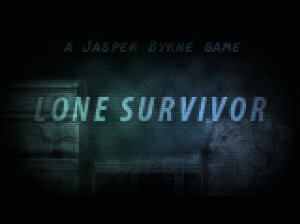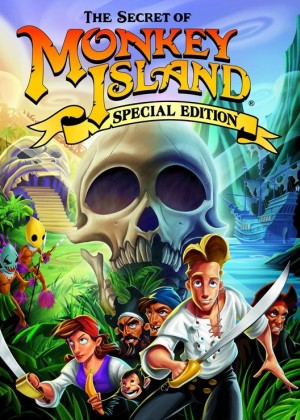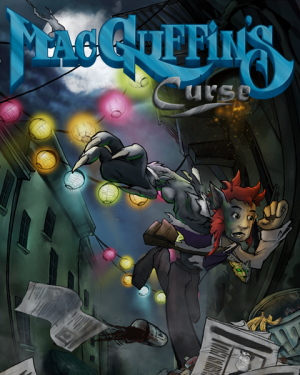No Sliding the Slippery Slope
Opinion & Special Features
Musings on the adventure genre, developer columns and other special features
A certain degree of polarized reaction was inevitable when we ran our recent Portal review, not to mention the likes of Professor Layton, Zack & Wiki, and the Penumbra series before that. Some would protest the appropriateness of covering such blatantly genre-defying games on a site called Adventure Gamers, while others would laud the open-minded embrace of so-called progress. Sure enough, like clockwork, both responses have occurred (some publicly, more privately). Such arguments used to be much longer and louder when we dared stick a toe outside the calm, shallow waters of tradition, but if the controversy is quieter now, the issue itself won't ever go away, so I thought I'd take a few moments to address it.
First, so that they don't get lost in a sea of exposition to follow, I'll start with a few points that stand as unshakeable truths:
* Adventure Gamers is committed to maintaining its daily focus exclusively on adventure games.
* Any game given full coverage here is deemed to be an adventure game, and any exception given partial coverage will be duly noted.
* Our definition and understanding of what constitutes an adventure game has not changed.
* The slope may be slippery, but our crampons are securely fastened.
* We care about genre distinction, but at the end of the day, it's still just fun and games.
We like to think of ourselves as fairly liberal in our interpretation of adventures. We don't discriminate by platform, as we're big supporters of consoles and handhelds, and as individuals we all have fairly diverse gaming tastes. (I personally enjoy shooters, RPGs, and action-adventures, and dabble in RTS and other genres occasionally.) And yet it's interesting to note that of all the main adventure sites, Adventure Gamers is the only one that hasn't deliberately moved into cross-genre coverage. That's neither right nor wrong on anyone's part, merely a choice. But having made our choice, it's one we're committed to upholding. We're a specialist site, and have neither the time nor the expertise to devote to other genres, so we won't dilute our focus. That's not going to change, and so our goals won't either.
You may at times see information (screenshots and news items in particular) about games that seem less-than-adventurish, and sometimes not see information about games that do (at least to you), but bear in mind that until we're able to see games in action for ourselves, it's often hard to know where a game falls along genre lines. Those decisions are based less on principle and more on guesswork. In some cases, that means either increasing or reducing coverage of certain games mid-stream as new details come to light. It doesn't happen often, but it will occasionally.
 |
Pathologic: less an adventure than a mishmash of genres. |
Sometimes a game gets all the way to completion and we still can't tell exactly what it is. Publishers then come with review copies in hand, asking for our full and undivided attention that may or may not be warranted. Other times we do know a game isn't an adventure, but we deem it to be of such interest to adventure gamers (whether from a beloved developer, a sequel to longstanding adventure series, etc.) that it deserves some attention anyway. In those cases, we tend to cover them as feature articles. These include games like Pathologic and Leisure Suit Larry: Magna Cum Laude. They're reviews in spirit, but since they can't be measured by the same criteria as adventures, it seems unfair to treat them as such, and potentially misleading. Such articles clearly spell out the reasons for not being considered adventures, but still, it wouldn't do to have people see MCL in our review list and assume it belongs to the core LSL series.
So no, we don't always limit ourselves solely to adventures. We do, however, make the proper distinctions where necessary. Of course, saying that will prompt some to blurt out, "But what about Game X!" Let's say… BeTrapped!, the Quest for Glory games, or Indigo Prophecy. Fair question. And here we return to the issue of one's definition of adventure. It's perhaps the most oft-debated, never-agreed-upon issue in the small but vocal adventure community, and the fact is, yours may not be quite the same as ours. But we do have one. We aren't simply making things up as we go along. (Or… well, I do that a lot, actually, but on this issue there's always a method to site madness.)
 |
Quest for Glory baaaarely made the adventure grade, after much debate. |
Some would argue that we dispense with such definitions altogether, often citing them as boundaries that restrict and confine the very things they define. But of course that's just silly. Definitions are tools of communication, nothing more, and publishers and developers are confined only by their imaginations and their choices, not a word. Let's face it, resisting definitions is like fearing a shadow. And this site is called Adventure Gamers, so it's inherently important that people understand what sorts of games they'll find here.
The thing is, though, the games people find here are often very different. As well they should be. We believe that an adventure is defined by its core elements rather than any superficial list of criteria or a slavish devotion to past presentation. The beauty of a broad perspective is that it allows breathing room without being uselessly vague. So what are those fundamental aspects? Well, the de facto definition was first established by Marek Bronstring many years back and still holds true today: "Adventure games focus on puzzle solving within a narrative framework." Or, adding an integral third element to the mix: "Adventure games are about stories, exploring worlds and solving puzzles."
Simple, isn't it? But since most games can lay some claim to these aspects, it's equally important to lay the groundwork for what an adventure EXCLUDES, and that same article goes on to say: "There are generally few or no action elements… Adventure games are not: role-playing games that involve action, team-building and points management; 3D action/adventure games such as Tomb Raider; side-scroller action games such as Mario or Rayman; puzzle games like Pandora’s Box or Tetris."
 |
Psychonauts: loved it... totally not an adventure |
The latter list could be expanded, but the point is that an adventure is not something that is more conveniently defined by other genre definitions. Tim Schafer's Psychonauts is a staff favourite and its connection to adventure game history had it poised for at least partial coverage on release. But it proved so obviously a platformer that further site attention just couldn't be justified. Does the Silent Hill series very much include puzzle solving within a narrative framework? Definitely. But the action quotient AND the fact that it belongs to an established "survival horror" genre precludes it from regular coverage here. Even "hidden object" casual games could be deemed adventures in some respects, but they have formed such a distinctive identity that they've demanded a genre classification of their own. Could we call them adventure games? Under the broad parameters of our definition, sure, but at this point it makes more sense to consider them something else and turn our attention elsewhere.
The common denominator among genre-blending games we have covered, then, is as much that they aren't recognizably something ELSE. Portal is a prime example. Is it a conventional adventure? Of course not. Does it focus on puzzle solving in a narrative framework? Certainly does, and in many ways, much more seamlessly than most traditional fare. The only area it falls short on is the exploration element, although that's something of a misnomer in this case, as you are certainly encouraged to explore every square inch of territory in pursuit of your goals. There just doesn't happen to be much of it to explore. Does the physical interaction bump the game into action genre territory? I would say no. Some players will disagree, but that will be the case no matter where one draws the line.
 |
Portal: as much claim to being an adventure as any genre. |
The amusing thing where action is concerned is that it's often considered a new phenomenon in adventures, even an "evolution" of the genre. Nothing could be further from the truth. It's not even new, let alone an evolution. Shortly after reviewing Portal, I played King's Quest II and spent an HOUR getting through one horribly difficult section. Ridiculously finicky keyboard controls, instant deaths, and a frequent and totally unavoidable random occurrence that would have caused a dead end later if I didn't reload to try again. Nice. I can guarantee you, while parts of Portal aren't easy, nothing in that game took me an hour to complete. So from an action/death/control perspective, Portal has one of the pioneers of graphic adventures (which also had a noticeable lack of intelligible story, I might add) beaten, hands down. Don't worry, Sierra fans, I'm not knocking King's Quest. Just using it as one of many examples of action in older adventures that make the current trend nothing more than a continuation of a longstanding tradition in its own right… Tradition. Yeah, funny that. I could just as easily have cited Tex Murphy, Gabriel Knight, or the Broken Sword games, but you get the idea.
So the games haven't really changed that much, and neither have the standards needed to define them. And it's our commitment to the same standards that allows us to avoid that dangerous "slippery slope". Every game is evaluated solely on its own merits. There is no "if we covered Game X, we need to cover Game Y" argument. None. If there's a reason we covered Game X, it's because we felt it measured up to the necessary test. Game Y is a totally new game, and must stand alone in facing the same judgement. Not everyone will agree with each choice, but everyone can be certain we apply the same principles to reach our conclusion in each case.
And of course, it's always possible we might make a mistake. I know, I know, that's hard to believe, but it could happen (in theory, obviously). We may be too lenient or too strict somewhere along the line that even we see in retrospect. I can honestly say that we've yet to cover a game in a way that I've second guessed after the fact, but if it does ever happen, rest assured that we won't compound one mistake with another. That's where the whole precedent process falls apart. A slippery slope is only dangerous if you keep sliding down. You can actually climb such a slope if properly equipped.
Given our fundamental definition of adventure and our commitment to maintaining that singleminded focus, we feel Adventure Gamers is just so equipped. Whether we succeed at that is for you to decide, but at least now you understand our perspective. If you find yourself asking "why did/didn't Adventure Gamers cover this game?", you don't quite have the answer, but you do now have the basis for working out the answer for yourself.
The other important thing to remember, of course, is that it ultimately doesn't matter much. It's our responsibility to our readers, even to the health of the genre, to take the issue seriously, and as much as we're able we accept that challenge. But at the end of the day, we're still talking about games. Just games. It's great to be passionate about our hobbies, but let's never forget to have a little fun doing it.
This article orginally appeared in Adventure Gamers' now-defunct blog.












